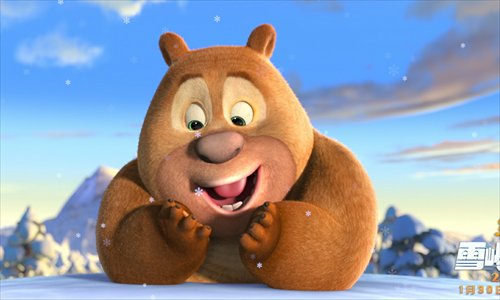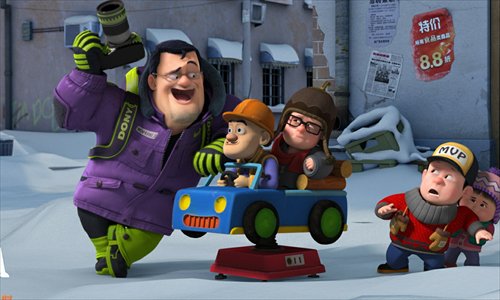Not suitable for children
The path to establishing movie ratings in China

Stills from Amazing Pleasant Goat Photos: CFP

Stills from Boonie Bears: Mystical Winter Photos: CFP

It's not unusual in China to see parents bring their young children to see the latest blockbuster in theaters. However, sometimes the results may not be what parents expected. For instance, during Stephen Chow's Journey to the West: Conquering the Demons many adults felt terrified when the film's river monster first appeared, to say nothing of how children were affected.
Yet, despite incidents like these many moviegoers will find themselves sitting next to small kids this month, especially due to the upcoming Chinese New Year meaning big hits like Journey to the West are the best choices available for some family entertainment.
While debate about censorship and the possibility of establishing a film rating system in China has raged on for years, the situation has changed little over the years.
Recently, the Shanghai based Hermes Institution for Children Education (HICE) published a report providing film and television rating guidance for parents and giving advice for families on what content is most suitable for what ages. In a related move, qq.com has also started what it calls its Mother Jury project, in which it invites parents to actively get involved in rating movies for children.
Unpleasant experiences
Last week qq.com held a film salon where they invited film and education experts to discuss the issue of what is appropriate for children to watch.
Liu Jing, deputy director of entertainment for streaming site qq.com, still remembers the first time she took her son to the movies when he was three years old.
Considering China's lack of ratings, she didn't think much about it when she took her son to see director Chen Kaige's action and fantasy movie The Promise.
After only five minutes, the boy began to cry. "It was a terrible experience. My son still remembers it and doesn't like to go to the movies," said Liu, during the salon.
Liu has discovered she's not the only person to have a similar experience.
"My colleague took her teenage daughter to see the comedy Breakup Buddies because she thought it was similar to Lost in Thailand," said Liu.
However, she soon realized her mistake, as Breakup Buddies is more like the Hangover movie series in that it's about two men who go on a wild trip to pick up girls.
"Plots about one night stands and having sex in a car made her feel really embarrassed - They didn't know whether it would be worse to stay or leave," said Liu.
Self-imposed limits
Some organizations and companies have taken it upon themselves to help build awareness about age appropriate content. For instance, qq.com's Mother Jury project has been inviting volunteers, mothers of children aged 3-13 to watch movies on their first day of release, after which participants will give their opinion based on criteria such as violence, bad language, sex and drug and alcohol use.
Editors at qq.com then gather these results produce a report classifying the film into one of three categories: General audience, 7-and-up (parental guidance suggested), and 13-and-up (parental guidance strongly suggested).
Zeng Jian, the chief editor of qq.com's movie channel, told the Global Times that they have been giving out such advice for a while now. Originally ratings were given based purely on the opinion of their editors, but as the reviews gained increasing attention from netizens, they decided to pass the task on to mothers.
"We are limited in what we can do," said Zeng. "But it is also very much needed."
HICE's classification system is more detailed, being divided into five categories: TV-K (ages 2-6), TV-G (6-7), TV-7 (7-10), TV-PG (10-14) and TV-14 (14 and up).
Popular animated series Pleasant Goat and Big Big Wolf, which contains a certain level of cartoon violence is category TV-7, while cartoon Boonie Bears, which contains sensitive language and the use of guns, is rated TV-PG.
HICE founder Doctor Lu Yufei from the Chinese Academy of Sciences told the Global Times that to create a rating system suitable for China, they studied the way ratings work in many other countries and how they established their systems.
According to Lu, ratings should be determined by professionals instead of the public.
"Many had doubts about whether Tom and Jerry should count as having violent behavior when compared to popular Chinese animations. There is a difference," said Lu.
She explained that many of the scenes in depicted in Tom and Jerry were things children couldn't imitate in real life, whereas in Pleasant Goat and Big Big Wolf, a movie that notoriously inspired a boy in China to burn his friends, behaviors can easily be copied.
Technical difficulties
During the salon, Kuang Yuqi, director of Vasoon Animation, the creators behind the Kui Ba trilogy, said that one of the crucial reasons why so many animated films and live-action movies targeted at young children are filled with violent acts and strong language is that children love to be stimulated.
"It's difficult to create an interesting plot [for children]," he said. "The easiest way to get their attention is to use violence and strong language - just hit someone with a saucepan and next time maybe stab someone with a pair of scissors…," Kuang added.
As it stands now, these self-established movie ratings seem to be a friendly and relatively easy way to solve parent's problems when it comes to figuring out what movie to take the family to.
However, many have pointed out that parents may have trouble putting these guidelines into practice in real life as children over 7 and 10 may no longer be interested in watching Pleasant Goat and Big Big Wolf or Boonie Bears because they are produced for a younger target audience.